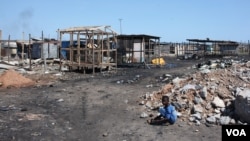A social cash transfer program in Ghana under which funds and health insurance premiums are provided by government to extremely poor families now covers more than 77,000 households throughout the country.
The program known as Livelihood Empowerment against Poverty has been going on for six years now. Its broad objective is to lessen the impact of poverty on society's most vulnerable people. Beneficiaries, including orphans, people with severe disabilities and the aged are given bi-monthly cash support ranging from $15 to $30 per family.
The program is administered by the Department of Social Welfare and Ministry of Gender, Children and Social Protection. Mawutor Ablor is a director at the Ministry. He said an impact assessment indicates that funds given out generate multiplier effects in local communities that result in a two-fold increase in the amount of money flowing in the economy.
“Some invest it. Some also buy goods and services in the community so it creates opportunity for those who are selling to bring in more goods and services to the community. By so doing, the money is affecting even those who are not beneficiaries,” said Ablor.
Participants are allowed to enlist on condition that they immunize and send their children to school. Ablor says that initiative is improving on the education status of children from poor families. But there are challenges. The program is supported by government and donor partners, such as UNICEF and aid agency Department for International Development.
There have been instances when budgetary constraints have created funding difficulties for Ghana’s government and delayed financial support to beneficiaries. “That belongs to history. We used to have this problem in the past but for almost one and a half years now, we have been very regular in the disbursement of the grant,” Ablor stated.
However, cash transfer for the months of September and October were made in November this year. Other limitations include the need for capacity building for staff at the district level where most of the funds are disbursed. Some care givers also create difficulties by collecting and keeping monies meant for upkeep of their older relatives.
“Initially, some people thought it is just a hand out so we needed to do a lot of sensitization for people to understand, sharing the results of the impact assessment to indicate that indeed, cash transfers can contribute to social and economic development," Ablor explained.
Minister of Gender, Children and Social Protection, Nana Oye Lithur said there are plans to scale up the program to cover 150,000 households by 2015. “Next year, we will also increase the amount that we give to beneficiaries. Next year, we are also doing a complete electronic rollout. So you will not see the manual. We are going to pay the money electronically,” Lithur noted.
Some five beneficiaries at James Town in Accra said they would like to see an upgrade in their health insurance status to cover a wider treatment option.










